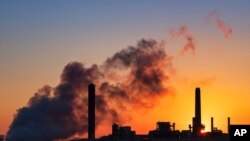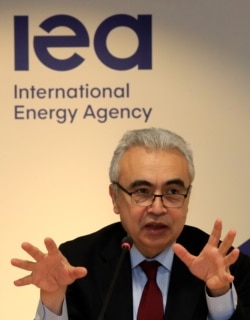A "viable but narrow" path exists for the world to avoid the most catastrophic impacts of climate change, the International Energy Agency (IEA) said in a report issued Tuesday.
It includes an immediate end to new investments in oil, gas and coal production, an end to sales of gas-powered cars by 2035, and installation of renewable energy at four times last year's record-breaking pace.
"The scale and speed of the efforts demanded by this critical and formidable goal ... make this perhaps the greatest challenge humankind has ever faced," IEA Executive Director Fatih Birol said in a statement.
On the plus side, the report said, the investment of $5 trillion per year by 2030 provides a major boost to the global economy, adding millions of jobs in clean energy, energy efficiency and manufacturing, and upping global GDP growth by 0.4 percentage points per year.
The Paris-based agency's report, "Net Zero by 2050: A Roadmap for the Global Energy Sector," said that the climate pledges countries have made so far, "even if fully achieved, would fall well short of what is required to bring global energy-related carbon dioxide (CO2) emissions to net zero by 2050" and limiting the global temperature rise to 1.5 degrees Celsius, the goal established by the U.N. Paris climate agreement.
The transition requires "an unprecedented transformation of how energy is produced, transported and used globally," the report said, including, "from today, no investment in new fossil fuel supply projects, and no further final investment decisions for new unabated coal plants," meaning plants with the ability to capture their CO2 emissions.
Electric power must be carbon-free by 2040, the report said, and vehicle manufacturers should stop selling internal combustion engines by 2035.
"This should be a clarion call to fossil fuel companies around the world that they cannot double down on business as usual," said Rachel Cleetus, policy director for the Climate and Energy Program at the Union of Concerned Scientists.
The report comes as U.S. President Joe Biden visited a Ford Motor Co. plant Tuesday that produces a new electric model of a popular pickup truck.
In a net-zero world, IEA says that by 2050, solar power will be the world's largest source of energy, and solar and wind together will produce 70% of the world's power.
However, existing technology will not be enough, it added.
Almost half of the emissions reductions in 2050 come from technologies that are not commercially available. That means governments need to invest heavily in research, development and deployment of new technologies such as advanced batteries, hydrogen fuel and direct-air capture of carbon dioxide, IEA said.
And it means the fossil fuel industry is not going away anytime soon.
"Any pathway to net zero must include continued innovation and use of natural gas and oil, which remains crucial to displacing coal in developing nations and enabling renewable energy," said Stephen Comstock, vice president of corporate policy at the American Petroleum Institute.
"Consistently, these analyses show that trying to achieve our climate objectives with only the technology we have today is an expensive and difficult proposition," said Philip Rossetti, senior energy researcher at R Street, a conservative policy analysis institute. "We're going to need true innovation, and the best tool for that is a free market that values those outcomes."
The IEA report said that roughly $40 billion per year, or about 1% of investments in the energy sector, are needed to bring electricity to the 785 million people worldwide without it, and clean cooking options to the 2.6 billion people who lack them. These investments will reduce indoor air pollution and avoid 2.5 million premature deaths per year.
"This transition is for and about people," Cleetus added, which "is as important as the techno-pathways that the report points out."
The report comes out with an eye toward the November global climate summit in Glasgow, when world leaders will meet to outline climate measures.
With heat waves, droughts and intense storms increasing with climate change, Cleetus added, "it's really important to recognize that inaction is the most costly thing we can do right now."
VOA's Jeff Custer contributed to this report.






